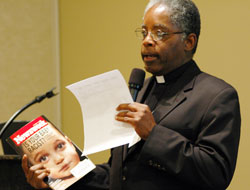Speakers say shared faith can transcend cultural differences

Father Kenneth Taylor, pastor of Holy Angels Parish in Indianapolis and director of the archdiocesan Office of Multicultural Ministry, discusses a story in Newsweek magazine, which addressed the question, “Is your baby racist?” He said people need to understand the reality of certain aspects of other cultures. (Photo by Mary Ann Wyand)
By Mary Ann Wyand
To better understand people of other cultures, Father Kenneth Taylor and Margarita Solis Deal explained, you must first understand their cultural history.
They examined the cultural differences, needs and similarities of Latino and black Catholics in the area of social ministry during the “Spreading Hope in Neighborhoods Everywhere” conference on Oct. 1 at Lucas Oil Stadium in Indianapolis.
Father Taylor is the pastor of Holy Angels Parish in Indianapolis and director of the archdiocesan Office of Multicultural Ministry. Solis Deal is the new coordinator of Hispanic outreach for the archdiocese.
In 1996, Archbishop Daniel M. Buechlein created the archdiocesan Office of Multicultural Ministry, Father Taylor said. Before that, the archdiocese provided a Hispanic apostolate.
“In the 1990s,” Father Taylor said, “there was a movement among the bishops of the United States to combine the various ethnic offices into multicultural ministry offices.”
He said the Office of Multicultural Ministry serves Hispanic, Latino, African-American, African, Vietnamese, Korean, Filipino and Indian Catholics who live in central and southern Indiana.
Cultural differences can be challenging, Solis Deal said, but with a little education these differences are less intimidating.
“When we talk about culture, especially here in the states, we are always walking around so many different issues,” she said, “not always sure about what to say.”
It’s important to remember that “we are Church,” Father Taylor and Solis Deal emphasized, and our shared faith can transcend any cultural differences.
“A lot of times when people think about culture, they think of food, clothing and music,” Father Taylor said, “but one description of culture that I like to use is that culture is how a group of people have decided to deal with their reality. When we get to a lot of cultural things that go beyond the tacos and greens, we have to know what the realities of the people are.”
Gospels and spirituals are popular forms of music with rhythmic and repetitive refrains, he said, but many people don’t know that this type of music originated because black people were not able to read, yet wanted to express their faith and love for God in songs.
“Not only couldn’t black people read,” Father Taylor said, “but it was against the law to teach black people to read.
“You need to know the reality of a people,” he said, “in order to help understand why certain aspects of a people’s culture are there.”
Language differences can be intimidating, Solis Deal explained, so people often focus on food or music to try to communicate with people of other cultures, but these are superficial ways to relate to others.
“We really struggle with how do we fully understand the way people think about time,” she said, “the way people think about government, the way people think about family, the way people think about education, the way people think about work ethic.”
To build trust and relationships, she said, it’s important to talk about cultural differences to better understand them.
“Do not shy away from it,” she said. “Ask the hard questions. Not only do different pasts impact our present, but what’s happening today is impacting the image we have of certain people.”
The heated debates on health care reform and immigration are two examples, she said. “What happens? Our children will hear it.”
Poverty is a major challenge in daily life for minority populations living in the U.S. and especially in Indiana, she said, and needs to be considered in the debates on health care reform and immigration.
“How do we come together and talk about it?” she asked. “The differences in the cultures are tremendous. That’s a lot of the connection that we still need to make. Learn your past, understand the present and then connect. Talk about it. The other thing to do is find resources. There are beautiful documents in the Church that talk about how to respond as a Catholic and an American to difficult [cultural] issues. The document ‘Welcoming the Stranger’ by our Indiana bishops is a beautiful document of how we stand here in the state of Indiana. This is how we respond as Church.”
To become Church together, Father Taylor said, we need to understand others and develop relationships.
“A big part of that is knowing about their history,” he said, “and what they’ve been through.”
Members of the black community appreciate the role of the federal government in society, he said, because the federal government freed them from slavery and segregation.
The Eucharist brings us together as Church, they said, and reminds us that we are not only neighbors, but also brothers and sisters in faith who have unique and special differences.
“As Catholics, our ultimate image is the Pentecost image,” Father Taylor said, “or the image from Revelation where the throngs stood before the throne of God—every nation, race, people and tongue—but they maintained who they were as a nation, race, people and tongue, and were all standing before the throne of the Lord.” †
